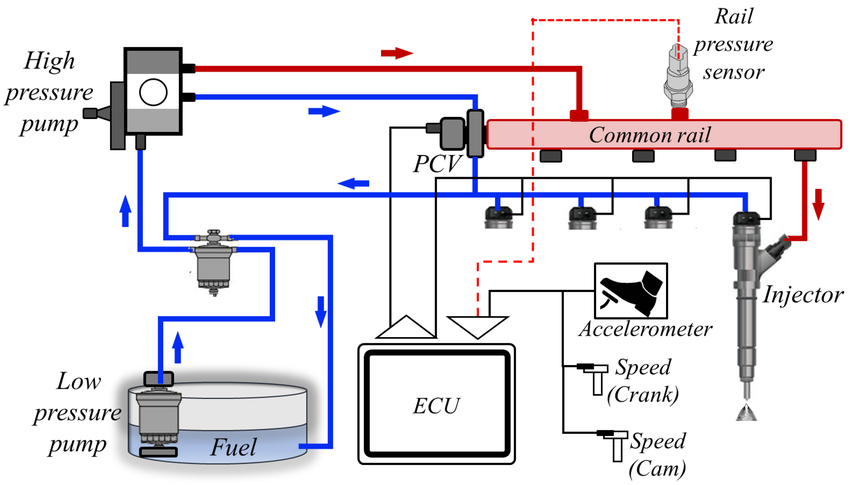Understanding Diesel Injector Failure – Causes, Symptoms & Solutions
- Adith Ramsudh
- Aug 25, 2025
- 3 min read

Diesel injectors are some of the most precise and hardworking components in any diesel engine. Operating at pressures up to 2,500 bar, they must deliver atomized fuel in microseconds, thousands of times per minute. Any irregularity in injector function can upset the entire combustion process, leading to performance loss, increased emissions, or even catastrophic engine damage.
At AA Diesel, we’ve seen injector failures across all major systems — Bosch, DENSO, Delphi, and Siemens. In this article, we’ll dive deeper into the causes of injector failure, the symptoms drivers should never ignore, and the advanced solutions available to extend injector life.
The Main Causes of Diesel Injector Failure
Fuel Contamination
Dirt, rust, or even fibers from poor-quality storage tanks enter the fuel system.
Water in diesel encourages corrosion and microbial growth ("diesel bug").
Microscopic particles block spray holes, causing poor atomization.
Incorrect Fuel Handling
Using petrol mixed with diesel (accidental misfuelling) damages injector seals.
Low-quality diesel with poor lubrication accelerates wear.
Injector Overheating
Prolonged idling, poor cooling, or clogged return lines can overheat injectors, leading to stuck needles and burnt tips.
Carbon Build-Up
Caused by leaking copper washers or poor seating during installation.
Leads to “black death,” where injectors are sealed in carbon deposits, often requiring major disassembly.
Mechanical Wear & Tear
After 150,000 – 200,000 km, injector nozzles and needles naturally wear.
Internal seals can fail, causing diesel leakage into oil (raising oil levels dangerously).
Common Symptoms of a Failing Injector
Hard starting or extended cranking
Loss of power and sluggish acceleration
Excessive smoke:
Black = over-fueling / poor combustion
White = unburnt fuel / injector dribbling
Blue = diesel mixing with oil
Diesel knock – sharp metallic ticking sound
Fuel dilution – engine oil level rising due to injector leakage
Misfire under load
Warning lights or fault codes such as P0201–P0204 (cylinder injector circuit errors)
Ignoring these signs often results in piston damage, cracked cylinder heads, or turbocharger failure.
Types of Injector Failures
Sticking Injector Needle – causes poor spray pattern, hard start, and misfire.
Leaking Nozzle – excess fuel delivery, smoke, and washed cylinder walls.
Electrical Failure – solenoid or piezo element burnout in modern injectors.
Mechanical Cracks – from over-torqueing or extreme pressures.
Back Leakage – worn seals allow excess return fuel flow, lowering rail pressure.
Advanced Injector Testing
At AA Diesel, we use specialized test benches to simulate real engine conditions. Our process includes:
Leak-off Testing – checks backflow of each injector.
Spray Pattern & Atomization Test – verifies nozzle efficiency.
Solenoid/Piezo Response Testing – ensures electrical activation is within milliseconds.
Flow Rate Calibration – measures precise delivery amounts.
Ultrasonic Cleaning – removes deposits without damaging precision parts.
Repair vs Replacement – What’s Best?
Repair & Reconditioning
Cost-effective
Involves cleaning, replacing seals, washers, and calibration
Best when injector body is intact and only components are worn
Replacement
Required when nozzles are cracked, piezo/solenoid elements are damaged, or body wear is excessive
More expensive but ensures reliability on heavily worn injectors
At AA Diesel, we provide honest diagnostics — we’ll only recommend replacement if repairs are not viable.
Real-World Example
Recently, a Toyota Hilux D-4D came into our workshop with hard starting, black smoke, and excessive fuel consumption. Testing revealed two injectors leaking excessively due to poor-quality diesel and missed filter changes. After reconditioning and recalibration, the engine regained full power, smoke was eliminated, and fuel consumption dropped by 20%.
Preventing Diesel Injector Failure
Use high-quality diesel and reputable filling stations.
Replace fuel filters at recommended intervals.
Drain water traps regularly.
Avoid long idling, which promotes carbon build-up.
Always use new washers and clean seats during installation.
Get injectors tested every 100,000 – 150,000 km as preventative maintenance.
Why Choose AA Diesel?
With over 30 years of combined experience, AA Diesel specializes in:
✅ Common rail & mechanical injector repairs✅ Denso, Bosch, Delphi & Siemens systems✅ Ultrasonic cleaning & advanced calibration✅ Diesel pump servicing & diagnostics✅ 6-month warranty on injector repairs
📧 infoaadiesel@gmail.com | 📞 082 602 7915
We pride ourselves on professional workmanship, using only quality parts, ensuring your diesel runs reliably and efficiently.
👉 Don’t wait for a breakdown — if you suspect injector trouble, contact AA Diesel today and let us get your vehicle running like new!









Comments